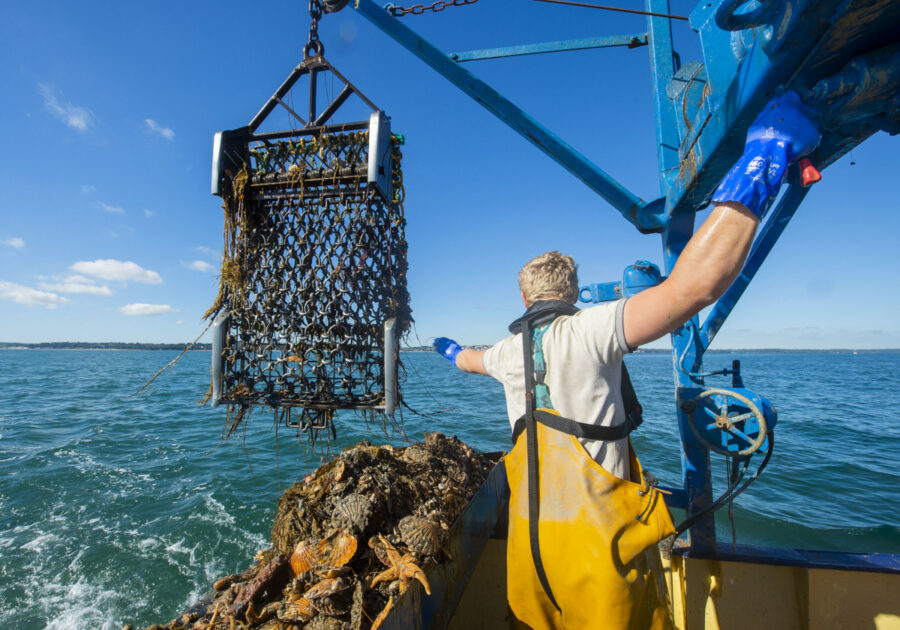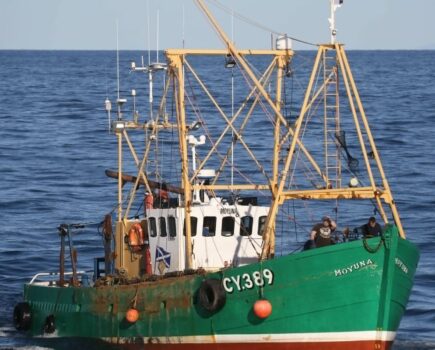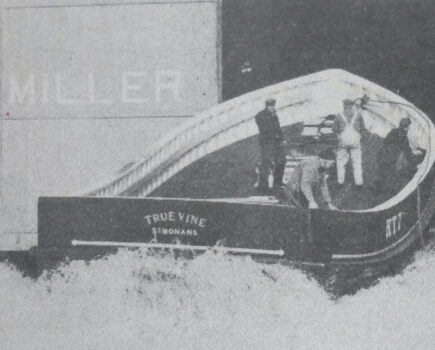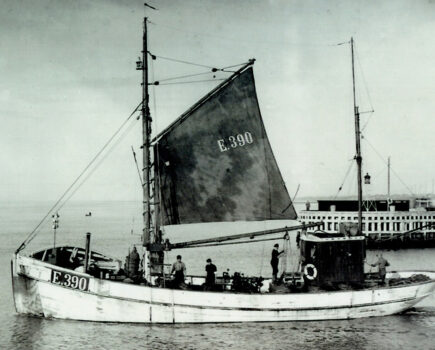A day’s fishing with a teenage skipper, supported by a thriving family business, reveals the potential for a brighter future for inshore fishing, reports John Periam. Photographs by Geoffrey Lee
An opportunity arose for Fishing News to spend a day on the Portsmouth-based U10 Vigilante P 3, scalloping in the Solent near the Isle of Wight. The boat, skippered single-handed by 19-year-old Ethan Leighton, is one of four owned by Eric McLeod, managing director of Viviers (UK) Ltd. He said: “I have always been keen to give those who show interest in the industry the chance to have a go and gain first-hand experience. We all have to start somewhere, and I will do my utmost to support those who want to achieve more out of life.”
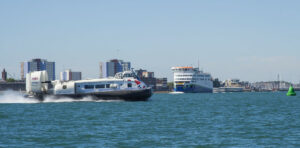
Scalloping in the Solent requires a careful watch, as there are plenty of operators in the shipping lanes.
Geoffrey Lee collected his trusty cameras and boarded Vigilante at Camber Dock at Old Portsmouth with Ethan Leighton at the helm. Also onboard was 17-year-old Teddie Day in the role of photographer’s assistant.
Built in 1978, the steel-hulled Vigilante has main dimensions of LOA 9.25m, beam 3.05m and GT 6.8t, and is powered by a four-cylinder Ford Dorset 54kW diesel engine. The two small split trawl winches, mounted on top of the stern gantry, are driven from the fore end of the main engine via a clutched pump.
The wheelhouse electronic equipment includes a Koden CVS-118 Mk II echosounder, Raymarine C120 plotter and Icom IC-M328 and M241 DSC/VHF radios.
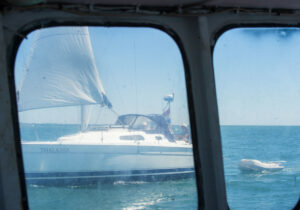
The view from the wheelhouse as a sailing boat gets too close for comfort while dredging is in progress.
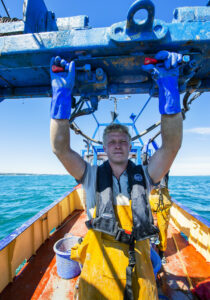
Ethan Leighton uses the winches to lower the dredges into the Solent.
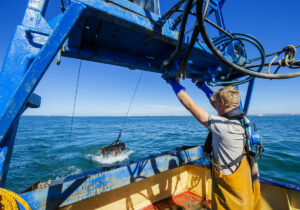
After 15 minutes, the dredges are slowly and smoothly lifted out of the sea.
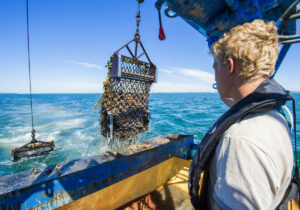
The dredges are raised and lowered several times to remove debris from the collector boxes.
Vigilante tows two 750mm N-Virodredge dredges. These are modified Newhaven dredges designed by Deeside Marine Ltd of Kirkcudbright, on which the fixed metal teeth are replaced by nine individually sprung tines. There are rollers underneath the 9×9 steel collector (or ‘belly’) bag. The 15mm steel skids on either side of the tine bar support the weight of the bar.
After the day’s safety brief had been completed, all onboard donned their KRU XF Automatic PFDs before the boat left Camber Quay – nestled between Sir Ben Ainslie’s INEOS Team UK base and Wightlink’s Gunwharf Terminal – at 7.30am. It was a sunny 22°C day, with a slight southwesterly breeze. Heading into the busy Solent, Ethan was continuously looking out for ferries, oil tankers, hovercraft and sailing boats.
Ethan planned to operate between Ryde Sands and No Man’s Land Fort. When he reached his starting position after 45 minutes’ steaming, he shot away 33 fathoms of Tyson’s 8mm wire. Vigilante was towing at 3 to 3.5 knots, in a sea depth of about 20m.
After about 15 minutes of towing the dredges, Ethan operated the two separate levers on the trawl gantry to heave in each dredge. When the dredges appeared on the surface, he would start to hoist up the port side dredge and then dunk it a few times back in and out of the water to clean the catch and remove any debris.
Once this was completed, the dredge was suspended over the stern of the boat onto the aft rubberised sorting area. The latch was then released to remove the catch from the collector bag. Once this was completed, the dredge was put back into the water and the process was repeated with the starboard dredge.
As the second tow began on a new heading, Ethan started sorting through the catch to pick out king scallops. These were put into baskets, having first been checked with the gauge to ensure that they met or exceeded the 110mm minimum size. They were then washed, counted, bagged and tied up.
Twice during the day while towing, despite the correct signage being clearly visible to indicate that the boat was dredging, and therefore had limited manoeuvrability, yachts passed by less than 10m away – reckless, especially given the amount of empty sea in the vicinity. No apology was forthcoming. “I need eyes in the back of my head at times,” said Ethan.
Over the course of the day, the scallops caught per tow ranged from 20 to 85 per dredge. Vigilante returned to Camber Quay with a total of 10 bags. On arrival, the boat was met by a forklift truck to carry the bags to the cold store, before delivery to Billingsgate market for sale.
Once the boat had been cleaned down, former fisherman Worzel, who has been the boat/building maintenance manager at Viviers for 14 years, helped Ethan to remove the two N-Virodredge dredges, as the skids needed replacing after months of constant use. James Tanner, a welder on Camber Quay for the past 20 years, started work on removing the old ones and welding replacement skids.
Ethan took command of Vigilante in July this year. He started working on fishing boats at the age of 14, alongside work in Viviers’ fish shop. Eric McLeod encouraged him to go to sea; he really started to enjoy it, and would get out whenever he could, even on his days off. He worked his way up from cabin boy to crewman, mate and now skipper. He has predominately fished for whelks, crabs, lobsters and scallops.
He said: “Another skipper asked me to join him on Vigilante, and after four months I was given the opportunity by Eric to take over running the boat – a challenge I could not refuse. I had always wanted so much to have my own boat, and this was a real chance to find out what was involved.”
Eric McLeod is very much one of the old school, and commands the respect and loyalty of those who work for him. Many of his staff have been with him for years. “This is what encouraged me to take this offer up,” said Ethan.
“I would love to see other young people coming into the industry. I have travelled to Scotland, Wales and Ilfracombe to get more work experience, but did not meet many fishermen of my age.
“It has been a learning curve from day one, when I took Vigilante out of Portsmouth harbour for the first time. Each trip I gain more confidence in what I am doing. Safety is important to me, and I make sure I keep fully up to date with the rules and regulations, especially as I work single-handed.
“I would like to do some beam trawling or potting in the future. Of course owning my own boat is a dream, but the current rules and regulations make that hard. Funding the purchase and getting a licence are just part of it. If I could get one tomorrow I would, that’s for sure. Then it would be a case of deciding where I fish, due to the current restrictions. I feel that once we are out of the EU, things could get better.”
Viviers: a family enterprise
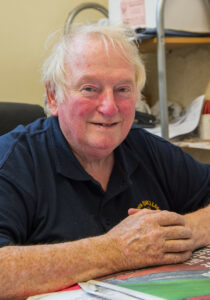
Eric McLeod, owner of Viviers (UK) Ltd…
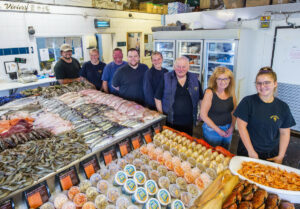
… with some of the Viviers team.
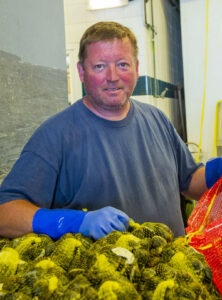
Viviers’ general manager, Eric’s son Stuart McLeod.
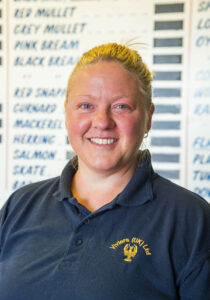
Kerri Jeffrey, Eric’s daughter, runs a weekend stall called Kerri’s Catch at farmers’ markets and high streets across the region.
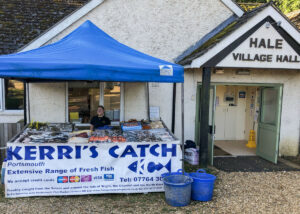
Erin McLeod, Eric’s grand-daughter, behind the Kerri’s Catch stall in Hale, Surrey.
Viviers (UK) Ltd operates from three locations: the business has a fresh fish counter and depuration tanks at Portsmouth, a fish counter and a wholesale sales outlet at Billingsgate in London, and a collection and distribution hut in Selsey in West Sussex.
It all started when Viviers’ managing director Eric McLeod was a young boy, fishing off the beach at Langstone Harbour in Hampshire. “I picked mussels and cockles, while at the same time fishing for bass, mackerel and mullet.
“Then the Browse brothers, who hailed from Paignton, turned up and started to catch crab and lobster, which had never been done there before. My interest grew, so I borrowed some funds and got a boat, and went out myself and started potting.
“After that, the Jersey fishermen turned up with their vivier boats, which were ex-French crabbers with Baudouin engines. I was very impressed, and ended up buying one from them called the Fin-ar-Bed, which was a 16m wooden crabber. When the summer came and the fishing dropped off, being adventurous I steamed it to the west coast of Scotland to seek fresh challenges. Boys will never grow up.”
There was no stopping Eric, and in time he had three vivier boats (hence the name of his company). Eventually, he got skippers for all of these so he could come ashore and open his business in 1995. Storage tanks were put in at Camber Dock so his catches of shellfish could be stored in proper conditions. This gave him the idea to start exporting; he purchased his first lorry and began transporting fish to France and Spain, ending up with three lorries and five drivers. In those days, 25 vessels used Camber Dock – now there are just nine. Viviers used to have an outlet at Bembridge on the Isle of Wight, but that closed due to the reduction in boat numbers.
Undeterred, Eric expanded further and took on a shed at Selsey, which he still operates. When he started there were about 20 boats fishing from there; now, sadly, there are only around eight. Eric also has a stand at Billingsgate, and every day at midnight fish are taken there by road. However, most of Eric’s fish is sold locally, and his shop at Portsmouth is a hive of activity – coronavirus has not had too much of an effect on sales.
He said: “The country needs fish, and young people need jobs, where they as individuals can own their own businesses. That is how I started and why today, given the opportunity to help others start out, I will.
“Sadly, there are so many rules and regulations now that I don’t think the young people can cope with it. Technology and government departments are taking over. More communication is needed between all parties. I have four youngsters who I am keen to get involved in what we do here, but every time I look at helping them, barriers pop up.
“I accept that education is important, but the best way that one can learn is to gain skills from current active fishermen. And we need those with a fishing background to work within the industry – science and conservation may be important, but at the end of the day, those sitting behind a desk need to know what a fisherman does. At times I hear of inspections at sea where those involved know little about the industry and what the fishermen are doing.”
Eric has a dedicated team at Portsmouth. Angela Lloyd, the company’s secretary, has been with Viviers for 25 years. She looks after all the company’s legal requirements, as well as dealing with the MCA, MMO and IFCAs to keep the boats safe, legal and up to date to go to sea.
Eric’s daughter Kerri Jeffrey looks after the marketing side of the business, and runs a weekend stall called ‘Kerri’s Catch’ at various farmers’ markets and high streets across the region. She comes in every Friday to prepare and select her stock, before travelling to the various venues on Saturday and Sunday. They can sell only UK-caught seafood at farmers’ market, whilst on the high street they can sell a wider range.
Eric’s son Stuart McLeod is Viviers’ general manager, and runs the bivalve depuration tanks. While the photographs for this feature were being taken, his team of Perry Stacey, Annette Heasman, John Yaxley and Eric’s grandson Murray McLeod were using riddling grates and a water sprayer conveyer belt to filter out undersized, open or broken clams, before they were jet-washed. The clams are then weighed into either 1kg or 3kg bags and labelled, before being delivered to Viviers’ stand at Billingsgate fishmarket the same night. The team processes between 400kg and 500kg of clams per day.
Becky Mundy is the Portsmouth wet fish shop’s counter manager, and has been in post for 15 years, with a staff of five now working for her. The shop is open seven days a week, ordering, gutting, cutting and filleting fresh fish. Becky is very proud of her counter display, and works hard to prepare it every morning. She said: “A smiling face is so important, and we have regular customers, including owners of local hotels and restaurants who prefer to personally call and select from the counter.
“Eric’s grand-daughters, 18-year-old Erin and 20-year-old Hannah, now work with me also. It is a real family affair, which our customers like to see. Even Eric pops his head around the corner from time to time to say hello to some of his regulars – though it’s not that easy at times to get him out of his office.”
At the young age of 77, Eric wakes up every morning looking forward to fresh challenges. He is the first to admit that he has had his highs and lows within the industry, including differences with the governing bodies – but once such issues have been sorted, life returns to normal. He has a good working knowledge of those who fish in the area, and is keen to help others and encourage new fishermen.
He hopes that once we are fully out of the EU, the support that fishing needs will return – though, he says, promises have been made many times before. “When I was young, there were a lot of boats, and plenty there for all to catch. I survived, but know only too well many who have not – but we are a tough nation. Coronavirus reared its head when we least expected it. It has been a worrying time for all, but I feel positive about the future.”

